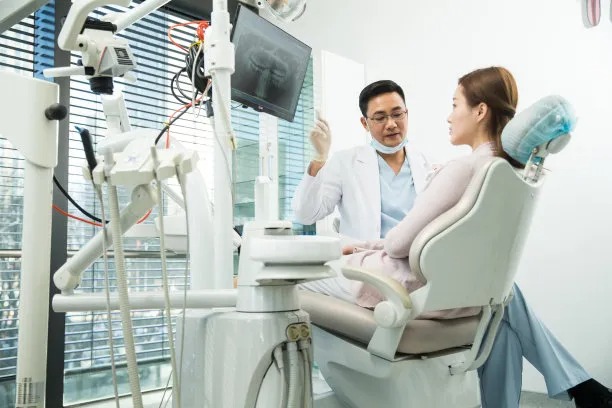Summary: Extracting a tooth can often be a necessary step in maintaining optimal oral health and overall wellbeing. This article delves into when it is appropriate to consider tooth extraction, the various situations that may warrant this decision, and the benefits that can result from the procedure. Four crucial aspects are discussed: the prevention of dental diseases, alleviation of overcrowding, addressing severe tooth decay or damage, and improving overall health. Each section provides insights into how tooth extraction can ultimately lead to better dental and physical health, supported by professional dental advice.
1. Prevention of Dental Diseases

Tooth extraction can play a pivotal role in preventing the spread of dental diseases. When a tooth is severely infected or decayed, it can lead to more significant issues, such as periodontal disease, which affects the surrounding gums and bone structure. By removing the problematic tooth, one can stop the infection from spreading and mitigate the risk of additional complications.
Moreover, retention of a decayed tooth can also compromise the health of adjacent teeth. The bacteria from the infected tooth can easily transfer to neighboring teeth, increasing the likelihood of decay or absorption of surrounding nutrients necessary for tooth health. Early extraction can protect the integrity of the entire dental structure.
Lastly, regular check-ups can help identify issues before they progress to the point of requiring extraction. Dentists often recommend proactive measures, and being alert to the signs of decay can prevent the onset of dental disease that necessitates such drastic measures.
2. Alleviation of Overcrowding
Another common scenario in which tooth extraction is recommended is overcrowding. In cases where the jaw is not large enough to accommodate all teeth, certain teeth may need to be removed to allow others to align properly. This condition is particularly common in orthodontic cases where braces are utilized to straighten teeth.
Overcrowding can lead to misalignment and bite issues, making proper oral hygiene more challenging. Cleaning misaligned teeth can be difficult, often resulting in plaque buildup and subsequently, cavities. By extracting certain teeth to relieve overcrowding, patients can achieve a healthier dental arrangement and more effective oral hygiene.
Moreover, addressing overcrowding can enhance the aesthetic appeal of one’s smile. Patients often feel more confident after they undergo orthodontic treatment that may include tooth extractions, as they can achieve a balanced and aligned set of teeth.
3. Addressing Severe Tooth Decay or Damage
Severe tooth decay or damage is perhaps one of the most common reasons for tooth extraction. When a tooth has been subjected to trauma or prolonged dental neglect, it can become so compromised that the only viable option is to extract it. This process often prevents more extensive health problems that can arise from keeping a damaged tooth.
In situations where restorative methods, such as crowns or fillings, are inadequate, extraction may provide the only solution to alleviate pain and restore functionality. A careful assessment by a dental professional can determine whether extraction is necessary, thus eliminating discomfort and preserving overall dental health.
Furthermore, damaged teeth can contribute to significant complications beyond the mouth. If an infected tooth is left untreated, it can lead to systemic problems, such as abscesses or even infections that spread to other parts of the body. Therefore, timely extraction becomes crucial in maintaining not just oral health but overall wellbeing.
4. Improving Overall Health
Beyond immediate oral health concerns, tooth extraction can facilitate improvements in overall health. Many studies have illustrated a correlation between oral health and systemic diseases; for example, severe dental infections can contribute to heart issues or diabetes complications. By addressing problematic teeth, patients can potentially reduce their risk of developing these systemic conditions.
Additionally, extraction often leads to significant improvements in overall function. Patients may find that after removing a problematic tooth, they can chew and speak more effectively, improving their quality of life and dietary habits. When dental health is prioritized, patients often experience a boost in general wellbeing.
Finally, mental health can also benefit from tooth extractions. Individuals who eliminate chronic dental pain or aesthetic concerns often report better emotional and psychological states. The confidence gained from a healthier mouth can empower individuals to engage more fully in their social lives.
Summary:
In summary, understanding when and why to consider tooth extraction is essential for maintaining not just oral health but overall holistic wellbeing. By addressing dental diseases, alleviating overcrowding, combating severe decay, and improving general health, individuals can experience a range of benefits. It is advisable to consult dental professionals to receive tailored advice that can guide decisions about tooth extractions.
This article is compiled by Vickong Dental and the content is for reference only.
Vickong Dental
Vickong Dental is a large medical group established in Hong Kong in 2008 by professors from well-known medical universities in Guangdong and Hong Kong, as well as medical doctors from key national '985' universities (including Master's supervisors and senior professors). The chain of branches brings together expert dentists with PhDs and Master's degrees from Hong Kong and Mainland China, committed to providing high-quality dental treatment.
"Vickong Dental Practices the University Motto of 'Healing and Serving Society,' with a Stable Operation for Sixteen Years. It Has Been honored with Hong Kong Enterprise Leaders's Choice,' and is a Global Trusted Implant Center for the Nobel Implant System. Recommended by Hong Kong Metro Broadcast and Guangdong Television, it Serves Customers from Over Thirty Countries and Regions, Gaining the Trust and Favor of Citizens from the Guangdong-Hong Kong-Macau Greater Bay Area and Surrounding Cities.

Thousands of customers' unanimous praise
The most recognized and highly recommended dental service by customers in the Guangdong-Hong Kong-Macau Greater Bay Area
We Ensure You Receive Detailed Care and Attention Here
Hong Kong standards, Shenzhen prices, Your Trusted English-speaking dentists

Vickong Dental Medical-Grade Instrument Disinfection Process
Vickong Dental Medical-Grade Instrument Disinfection Process

Vickong Dental Chain: A Warm and Comfortable Environment for Treatment






Appointment Hours

Q&A
Why choose Vickong Dental?
Vickong Dental practices the university motto 「Medicine to Benefit Society」, with each branch bringing together highly qualified dentists with doctoral and master’s degrees from Hong Kong and the Mainland, and has maintained seventeen years of steady operation。Recipient of 「2024 Hong Kong Enterprise Leaders Brand」, 「2025 Hong Kong Enterprise Leaders Brand」, a Nobel Biocare Global Trusted Implant Center, and a brand recommended by Metro Radio Hong Kong and Guangdong TV。
To date, we have served customers from more than thirty countries and regions,earning exceptionally high word-of-mouth recognition and trusted recommendations from residents across the Guangdong-Hong Kong-Macao Greater Bay Area and surrounding cities
We have eight major branches in Zhuhai、Shenzhen,and a consultation and service assurance center in Hong Kong,so you can book a free consultation at any time for any questions,which is very reassuring.
If I do not accept the quotation after the CT scan, will I be charged??
No! As long as the actual treatment has not started, you will not be charged any fees.
Will there be any additional charges during the treatment process?
No, there won’t be any additional charges. Before treatment begins, we will clearly explain the treatment plan and its corresponding fees. Only after the patient agrees and signs the consent form will we proceed with the dental service.
Can I pay in Hong Kong dollars?
Yes. Vickong Dental accepts payment in Hong Kong dollars. The amount will be converted based on the exchange rate of the day, and the applicable rate will be clearly communicated to you in advance.
Can I reschedule my appointment at any time?
Yes. Please contact us via **WeChat** or **WhatsApp** as early as possible, providing your original appointment time and details, along with your preferred new date and time slot for rescheduling.













